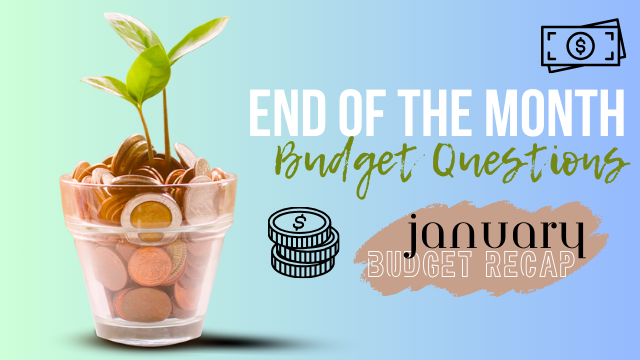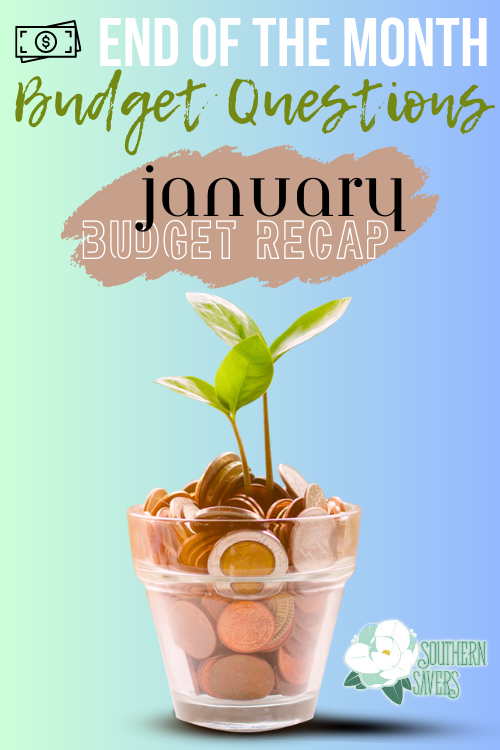This post may contain affiliate links. Read our disclosure here.

I’m a big fan of budgets, which probably isn’t surprising. Writing out a budget only works though if you check in on your spending. If I don’t regularly check in with my spending and budgeting, I’m going to fall off the wagon. I find it helpful to check in at the end of the month to see how the month went and if there is any tweaking I need to do before a new month is underway.
If you don’t have a budget, then you probably will want to start there. See my post on how to start a budget!
If you do have a budget, then here are some things to think about as January comes to a close. Consider this post your sign to do a January budget recap and help you get some perspective so you can stay on track for the rest of the year.
End of the Month Budget Questions | January Budget Recap
Did you actually track your spending?
You might have a budget, but if you didn’t track your spending, then it’s not going to help you very much. Remember that a budget is just a plan. You might set aside $600 for groceries and $100 for eating out, but you might end up spending $500 on groceries and $200 on eating out. You’ve still spent the same amount of money, and it’s OK if you move money around throughout the month. If you didn’t actually track your spending, then I’d stop here and ask yourself why that might have been the case, and think of something you could change as the new month starts.

How much did you spend last month?
If you did track your spending, great job! Now you can zoom out and look at your overall spending. You can also look at individual categories and see what your spending was. If it seems like a lot for that particular category, examine spending — did something weird happen last month? For example, this month I noticed that we spent a lot more on groceries. But I’ve been out of commission for most of the month with sickness, so I’ve been more likely to buy convenience foods and things that are easier to cook. I hope that will be different next month, and I’m not upset with what this month looked like. But if you start to see a pattern of spending more in a category and you don’t really have a good reason why, it might be time to think about what needs to change.
Will you be planning to spend more on a certain category in the coming month?
Let’s say you didn’t spend anything on dog food in January because you got a lot on sale last year. But the bags are running out and you’re going to have to stock up. Make sure you plan to allot more in the next month!
Is there any category where you need to adjust your planned spending?
Example: I usually spend $2.50 each day that I work from a local coffee shop. Next month, for a variety of reasons, I’ll only be working from home, so I can plan not to set anything aside.

Are there any holidays or events coming up that will cause you to spend more?
If it’s substantial, consider creating a new budget category for next year for that (e.g. Valentine’s Day date night). Are certain items likely to go on sale this month that I will want to stock up on? Check out What to Buy in February to see what might be worth stocking up on.
Are there any recurring expenses that won’t happen this month?
Maybe your child’s daycare gives you a cost break over the holidays, or maybe you decide to pause a few subscriptions.
Are there new sinking funds that have come to your attention?
Budgets are dynamic—they should always be available to change. Sometimes more recurring expenses come up that you forgot about. This is especially true if you’re new to budgeting. Maybe you forgot your yearly car taxes are due in March. That’s going to hurt a little this year, but if you start planning ahead for the next time they’re due and set a little aside each month, you’ll be in a much better spot next year!

Do an inventory check—how are you on groceries, personal care items, household items?
This doesn’t have to be complicated, but it’s good to know what things you might be running low on as well as things you have plenty of so that in the coming month you’re not tempted to overbuy or run out. You can keep an eye on sales and stock up.
Are there any new categories you need to add to your budget?
Did you decide to get a gym membership? Or maybe you made a resolution to read more, and that led to signing up for an Audible membership. Whatever it is, make sure you add that category to your budget so you can plan for it each month!



